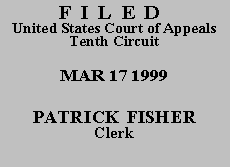

| UNITED STATES OF AMERICA,
Plaintiff-Appellee, v. 9520 S. 193RD E. AVE., BROKEN ARROW, OK, ONE PARCEL OF REAL PROPERTY KNOWN AS, with buildings, appurtenances, improvements and contents; 10241 S. 215TH E. AVE., BROKEN ARROW, WAGONER COUNTY, OKLAHOMA, ONE PARCEL OF REAL PROPERTY KNOWN AS, with buildings, appurtenances, improvements and contents, |
|
Mario Garcia, a federal prisoner appearing pro se, appeals the district court's denial of his Fed. R. Civ. P. 60(b) motion for relief from judgment. We exercise jurisdiction pursuant to 28 U.S.C. § 1291 and affirm.
On June 30, 1989, approximately eight months after Garcia was arrested while transporting cocaine from Florida to Oklahoma, the United States filed this in rem action seeking civil forfeiture of two parcels of real property, with buildings, appurtenances, improvements, and contents, and one vehicle, pursuant to 21 U.S.C. §§ 881(a)(4), (6), and (7). The United States subsequently filed notices of dismissal as to the vehicle and all contents valued at less than $1,000. Garcia, represented by counsel, filed a verified claim and answer. On December 5, 1989, the district court stayed the action pending completion of federal criminal proceedings against Garcia.
During the course of the stay, the United States filed two motions for interlocutory sale of the seized property and both motions were granted. The first motion was filed on December 20, 1989, and pertained to three horses seized with one of the parcels of real property. The motion was granted on January 18, 1990, and the proceeds of the sale were ordered retained pending the outcome of the case. The second motion was filed on February 13, 1991, and pertained to the two parcels of real property. The motion was granted on February 22, 1991, and the court directed that the proceeds of the sale be paid to Liberty National Bank & Trust Company.
The stay was ultimately lifted on April 15, 1992, following Garcia's conviction of various drug-related offenses. The district court granted summary judgment in favor of the government on September 27, 1993. Nearly four years later, on September 25, 1997, Garcia filed a motion for relief from judgment pursuant to Fed. R. Civ. P. 60(b)(6).
We review the district court's denial of Garcia's motion for an abuse of discretion. See Stubblefield v. Windsor Capital Group, 74 F.3d 990, 994 (10th Cir. 1996).
Garcia contends he was deprived of due process of law during the civil forfeiture proceedings. In particular, he argues he was deprived of the pre-seizure hearing described in United States v. James Daniel Good Real Property, 510 U.S. 43, 59 (1993). In addition, he argues he did not receive proper notice of the district court's orders allowing interlocutory sales of property.
Even assuming, for purposes of argument, that the pre-seizure hearing requirements outlined in Good are applicable to this case(1) and the court failed to comply with those requirements, we find no basis for invalidating the judgment. In United States v. 51 Pieces of Real Property, 17 F.3d 1306, 1315 (10th Cir. 1994), we emphasized a seizure violative of Good "does not necessarily invalidate the forfeiture." Instead, we held a judgment of forfeiture may stand as long "'as impermissibly obtained evidence [wa]s not used in the forfeiture proceeding,'" and the government returns any rents that accrued during the illegal seizure of the properties at issue. Id. at 1316 (quoting United States v. 4492 S. Livonia Rd.,, 889 F.2d 1258, 1265 (2d Cir. 1989)). Having reviewed the record in this case, we agree with the district court that no evidence obtained during the seizure was used against Garcia in the forfeiture proceedings and no rents accrued during the period of seizure.
We also reject Garcia's argument that he did not receive proper notice of the interlocutory sales. It is uncontroverted that Garcia appeared in the case and was represented by counsel at all times. Under these circumstances, we are unwilling to conclude, based upon Garcia's bald assertions, that his counsel did not receive copies of the government's motions for interlocutory sale or the court's orders granting those motions. In any event, the record clearly indicated Garcia attempted, but failed, to establish a meritorious defense to the forfeiture action, and he did not file a direct appeal from the entry of summary judgment. See McLawhorn v. John W. Daniel & Co., Inc., 924 F.2d 535, 538 (4th Cir. 1991) (party seeking relief from judgment assumes burden of showing meritorious defense against claim on which judgment was entered as threshold condition to any relief). Accordingly, he is not entitled to the extraordinary relief offered by Rule 60(b). See In re Gledhill, 76 F.3d 1070, 1080 (10th Cir. 1996) (Rule 60(b) relief available only in extraordinary circumstances when such action is necessary to accomplish justice).
AFFIRMED. The mandate shall issue forthwith.
Entered for the Court
Mary Beck Briscoe
Circuit Judge
*. This order and judgment is not binding precedent, except under the doctrines of law of the case, res judicata, and collateral estoppel. The court generally disfavors the citation of orders and judgments; nevertheless, an order and judgment may be cited under the terms and conditions of 10th Cir. R. 36.3.
1. Good was issued on December 13, 1993, approximately two and one-half months after summary judgment was entered in favor of the government. Arguably, the judgment here became final prior to issuance of Good and it was not affected by Good. See, e.g., United States v. Marsh, 105 F.3d 927, 931 (4th Cir. 1997) (Good applicable to all cases not yet final on date of decision); United States v. All Assets and Equipment of West Side Building Corp., 58 F.3d 1181, 1191 (7th Cir. 1995) (same); United States v. Real Property Located at 20832 Big Rock Drive, 51 F.3d 1402, 1405-06 (9th Cir. 1995) (same); United States v. Certain Real Property Located at 16510 Ashton, 47 F.3d 1465, 1470 (6th Cir. 1995) (same).